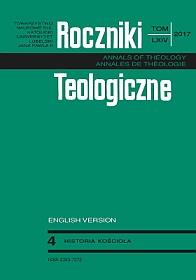In die tribulationis: The Ordaining of Priests for the Diocese of Lublin During the Second World War
Abstrakt
A major problem of the diocese of Lublin during the Second World War was the replenishment of its clergy. In the initial period of the war, Lublin Seminary remained closed. Its bishops were arrested and deported from Lublin. In these circumstances, it was necessary to use some extraordinary efforts to continue the formation of seminarians and lead them to ordination. Right after the Germans entered Lublin in September 1939, the Lublin Auxiliary Bishop, Władysław Goral, still succeeded in ordaining a few seminarians in the seminary church. Then, in 1940, the auxiliary bishop of the Diocese of Pinsk, Karol Niemira, arrived in Lublin and ordained a large group of seminarians. In 1941, one seminarian was ordained in Vilnius. Some regularity in ordination returned in the years 1941-1944, when the Germans allowed the Lublin Seminary to reopen. The seminarians had to travel in small groups to Nowy Sącz, though, where the bishop of the diocese of Lublin, Marian Leon Fulman, was interned. They were secretly ordained by him in the private chapel of the rectory. Shortly after he returned to Lublin, but before the war was ended in 1945, Bishop Fulman ordained another seminarian in his bishop's chapel. In total, during the Second World War, fifty-eight new priests were ordained for the diocese of Lublin.
Bibliografia
Bieńkowski J., Wspomnienie kapłana wyświęconego przez biskupa Fulmana w czasie wojny w Nowym Sączu, w: Biskup lubelski Marian Leon Fulman. Pedagog trudnych lat, red. E. Walewander, Lublin: TN KUL 2010, s. 233-235.
Diecezja lubelska. Informator historyczny i administracyjny, oprac. M.T. Zahajkiewicz, Lublin: Wydawnictwo Kurii Biskupiej w Lublinie 1985.
Goliński Z., Diecezja w l. 1939-1944. Lublin – Oranienburg – Nowy Sącz – Lublin. Lata 1939-1945 w życiu J.E. Ks. Bpa Fulmana, „Wiadomości Diecezjalne Lubelskie” 1945, nr 4, s. 102-109.
Goliński Z., Diecezja w latach 1939-1945. Prześladowania niemieckie duchowieństwa w diecezji lubelskiej, „Wiadomości Diecezjalne Lubelskie” 1946, nr 9, s. 328-340.
Goliński Z., Wojenne losy naszych gmachów kościelnych, „Wiadomości Diecezjalne Lubelskie” 1946, nr 5, s. 185-187.
Kalendarz liturgiczny i skrócony informator Archidiecezji Lubelskiej na rok 2011, oprac. Cz. Krakowiak, H. Czarnecki, Lublin: Kuria Metropolitalna w Lublinie 2010.
Marczewski J.R., Powojenne losy biskupa Mariana Leona Fulmana, w: Pater Ecclesiae Lublinensis. Studia w 65. rocznicę śmierci biskupa Mariana Leona Fulmana (1866-1945), red. J.R. Marczewski, Lublin: Wydawnictwo Archidiecezji Lubelskiej Gaudium 2010, s. 293-314.
Młynarczyk S., Jubileusz 25-lecia święceń kapłańskich (1940-1965), „Wiadomości Diecezjalne Lubelskie” 1965, nr 1-7, s. 162-163; 1965, nr 8-12, s. 259-260.
Młynarczyk S., Seminarium Diecezjalne Lubelskie, „Wiadomości Diecezjalne Lubelskie” 1964, nr 8-12, s. 121-137.
Schematyzm diecezji zamojsko-lubaczowskiej. Rocznik I po erygowaniu diecezji w 1992 r., stan z dnia 1 grudnia 1994 r., oprac. F. Greniuk, L. Cybruch, Zamość: Kuria Diecezjalna Zamość 1995.
Spis kościołów i duchowieństwa diecezji lubelskiej 1939, Lublin: Kuria Biskupia w Lublinie 1939.
Spis kościołów i duchowieństwa diecezji lubelskiej 1948, Lublin: Kuria Biskupia w Lublinie 1948.
Starnawski Z., Martyrologium duchowieństwa diecezji lubelskiej w latach 1939-1945. Słownik biograficzny [mps w AAL].
Stopniak P., Diecezja w latach 1939-1945. Sprawozdanie z losów i prac seminarium duchownego za lata 1939-1945, „Wiadomości Diecezjalne Lubelskie” 1946, nr 7, s. 259-264.
Tarnowski P., Śp. Ks. Piotr Gąder (1914-1993), „Kronika Diecezji Sandomierskiej” 1994, nr 3-4, s. 189-192.
Wieliczko M., Kontekst historyczny losów biskupa Mariana Leona Fulmana w czasie drugiej wojny światowej, w: Biskup lubelski Marian Leon Fulman. Pedagog trudnych lat, red. E. Walewander, Lublin: TN KUL 2010, s. 89-122.
Copyright (c) 2017 Roczniki Teologiczne

Utwór dostępny jest na licencji Creative Commons Uznanie autorstwa – Użycie niekomercyjne – Bez utworów zależnych 4.0 Międzynarodowe.





